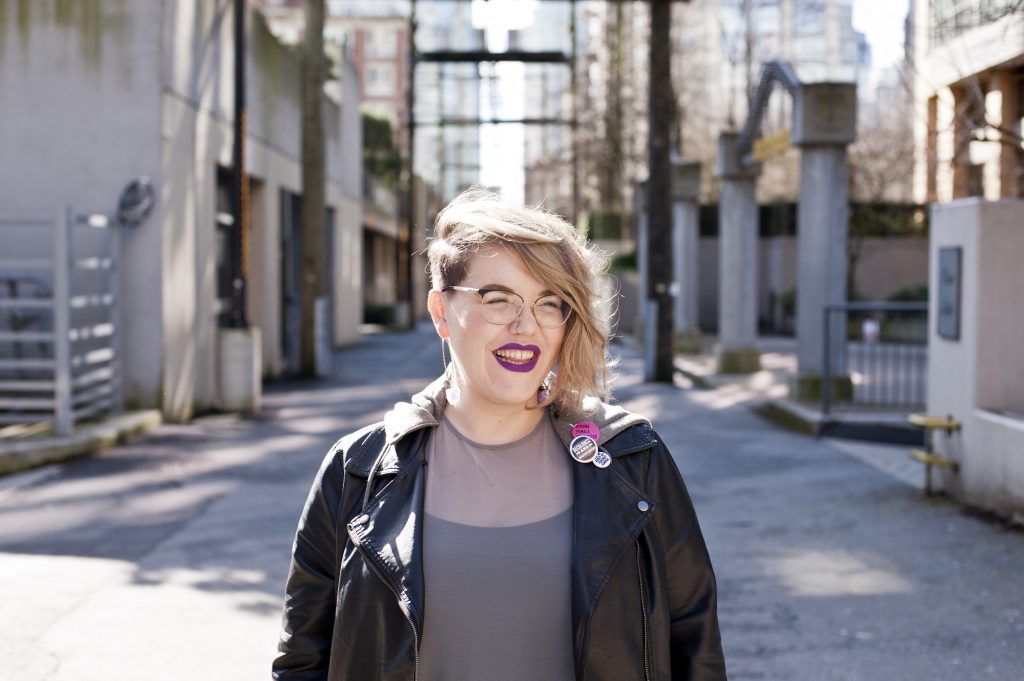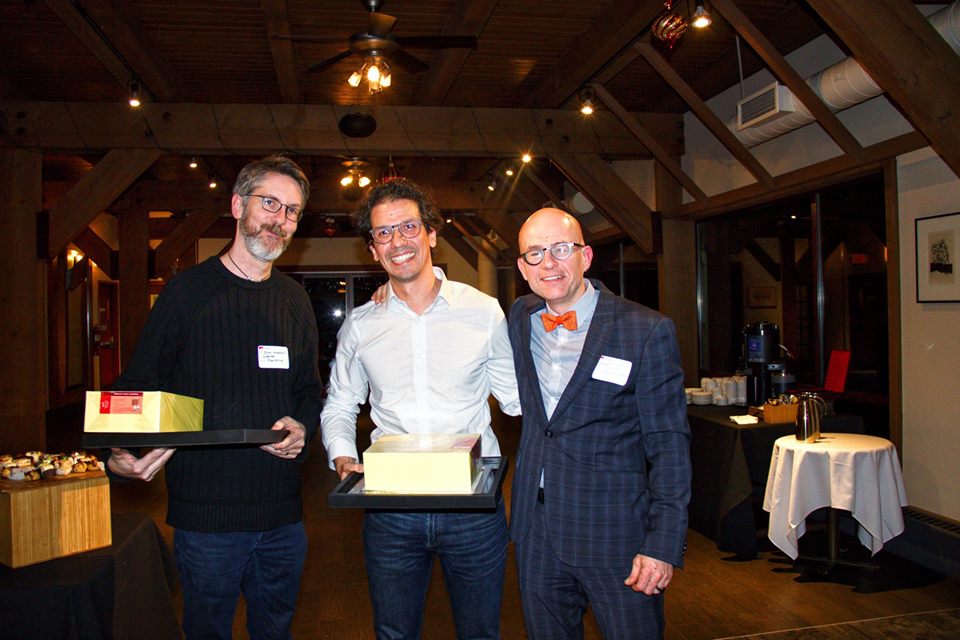Making Research Knowledge Public Award | Interview with recipients Hannah McGregor and Juan Pablo Alperin

“Sometimes people need to be told that your work is for them, or invited in some way,” says Hannah McGregor, an assistant professor in Simon Fraser University’s Publishing Department and the host and producer of the podcast Secret Feminist Agenda. “There are lots of ways to invite people into your work, but I think one of the best is to think about the kind of language and media that you use.”
The podcast, which she describes as “a weekly discussion of the insidious, nefarious, insurgent, and mundane ways we enact our feminism in our daily lives,” is just one of the many ways McGregor invites the public to engage with her work. She’s also active on social media, a co-editor of a new book exploring the state of Canadian Literature, and the organizer of Publishing Unbound, a workshop that brought together authors, activists, scholars, and publishing professionals to discuss inclusivity and accountability in Canadian Literature.
As of this December, she is also a co-recipient—with ScholCommLab director Juan Pablo Alperin—of the inaugural Research Excellence Award for Making Research Knowledge Public. Adjudicated by a university-wide panel, the award was jointly presented to the duo in recognition of their “demonstrated excellence in making research outcomes and insights public and in engaging new communities with scholarly or artistic work.”

Like McGregor, Alperin is an assistant professor in the Publishing Department and a strong believer in the importance of public scholarship. But while McGregor takes a public-focused approach to making research knowledge public, Alperin’s work is centred within the academic system itself—dedicated to investigating the ins and outs of open access publishing, the barriers that prevent academics from engaging in public scholarship, and more.
In celebration of the award, we asked Alperin and McGregor to share their views on making research knowledge public and the challenges that sometimes stand in the way.
What does “making research knowledge public” look like to you?
Juan Pablo Alperin: I see open access as a very basic, initial step toward making research knowledge public. We never know who in society might care about our work, regardless of how niche an audience we might have in mind. My own research and other evidence points to the fact that there are members of the public who want to know. Even if faculty don’t want to change anything else about what they do, they can make sure that their research is at least accessible to anyone who wants to see it. For me, making research knowledge public is about enabling and supporting an ecosystem in which that becomes the norm.
Hannah McGregor: I think open access should be the default and baseline, particularly for journals. But access goes beyond just paywalls; it also has to do with language and discoverability. Journals—open access or not—still circulate within particular systems of discoverability that are available mostly to people who know how universities work.
The side of things that I have been working on is what my colleague Jon Bath calls public-first scholarship. I’ve been thinking about what it means to do your work in the public from the get-go, rather than doing it within the university and then making it public later. I’m making podcasts, because podcasts are not a university medium. They are a medium that has their own logic, a logic that is inherently open and inherently public-facing. I want the audience for my work to not be precluded by people who have access to scholarship.
What are the top challenges when it comes to public scholarship?
JPA: What I see as the biggest challenge is getting academics to think and care about non-academic audiences—to start believing that making research available matters. Everyone cares in a very abstract way, but not everyone thinks about non-academic audiences as important constituents who they have a duty to share their work with. We need to shift that perspective so that faculty see public scholarship as a primary objective of their work, and not way down the list of things they have to do. We need to make it a priority.
“We need to shift that perspective so that faculty see public scholarship as a primary objective of their work, and not way down the list of things they have to do. We need to make it a priority.”
Juan Pablo Alperin
HM: For me, it’s the finitude of our time and energies. I’ve been working on my podcast for a year and a half. I love making it, but I also can do almost nothing else while I’m working on it. Many, many scholars doing this kind of work have been facing this challenge for ages: you end up having to do twice the work. You have to do all of the traditionally recognized scholarship in order to secure a job and then secure promotion and tenure. But at the same time, you want to do this other work—the work that, in my view, really matters.
The podcast is great and brings me a lot of public interest in my work. But can I get tenure for a podcast? Maybe not.
If you could change one thing…
HM: I’d like to see some pretty significant transformations in how, at the departmental level, research is valued. I think non-traditional scholarly options need to be taken seriously as the primary output of scholars. Based in part on conversations that I’ve had with other academics and in part on research that came out of this lab on public scholarship and the degree to which it’s represented in tenure and promotion documents, we know that the vast majority of university departments do not care about public scholarship. They care about published journal articles in peer-reviewed journals. People have finite energy, and if one thing is going to get you a job and the other is going to get you a thumbs up, but ultimately no financial security, what thing are you going to choose?
“Non-traditional scholarly options need to be taken seriously as the primary output of scholars… People have finite energy, and if one thing is going to get you a job and the other is going to get you a thumbs up, but ultimately no financial security, what thing are you going to choose?”
Hannah McGregor
What do you think researchers could do better?
JPA: There’s a lot more that could be done around sharing, disseminating, and talking about our work in a wide range of venues. We need to look for broader audiences for our research—be that by posting on social media, doing outreach to media, or creating infographics and other simplified forms of communicating our results.
We need to widen our conception of who our audience is. An audience could be anyone, so just put your research out there in slightly different forms and different ways—as many as come to mind and as you have time and resources for.
For more information about the Research Excellence Awards, visit FCAT’s website.

[…] blog post was first published on the Scholarly Communications Lab Blog, and has been reposted here with […]